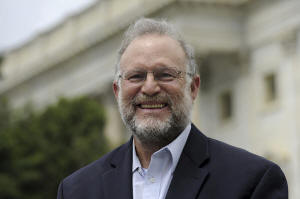Jerry quits Ben & Jerry's, saying its independence on social issues has
been stifled
[September 18, 2025] By
MICHELLE CHAPMAN and WYATTE GRANTHAM-PHILIPS
Ben & Jerry's co-founder Jerry Greenfield is leaving the ice cream brand
after 47 years, saying that the independence it once had to speak up on
social issues has been stifled by its parent company Unilever.
In a letter, which co-founder Ben Cohen posted on social media on
Greenfield's behalf, Greenfield said he could not “in good conscience”
remain at Ben & Jerry's — citing a loss of independence to Unilever,
which he said had once agreed to give Ben & Jerry's autonomy around its
social mission when it acquired the brand more than two decades ago.
“For more than 20 years under their ownership, Ben & Jerry's stood up
and spoke out in support of peace, justice and human rights, not as
abstract concepts, but in relation to real events happening in our
world,” Greenfield wrote “It's profoundly disappointing to come to the
conclusion that that independence, the very basis of our sale to
Unilever, is gone.”
Ben & Jerry’s, famous for its colorful ice cream containers with flavor
names such as Cherry Garcia and Phish Food, has also long been known for
its progressive political values — speaking out on a range of social
issues over the years. And in his letter late Tuesday, Greenfield noted
that the brand's loss of independence arrived at time in the U.S. when
the Trump administration “is attacking civil rights, voting rights, the
rights of immigrants, women and the LGBTQ community."
"Standing up for the values of justice, equity, and our shared humanity
has never been more important, and yet Ben & Jerry's has been silenced,
sidelined for fear of upsetting those in power," he wrote.

Tensions between Ben & Jerry's and its parent have heightened in recent
years — with the ice cream brand accusing Unilever of silencing its
statements in support of Palestinians amid Israel's war in Gaza, among
other conflicts. And Greenfield's departure also arrives as the consumer
product giant, based in London, is spinning off its ice cream business
into a stand-alone company called The Magnum Ice Cream Company.
In a statement on Wednesday, a spokesperson for Magnum said that it
would be forever grateful to Greenfield for his contributions to Ben &
Jerry’s and thanked him for his service, but was not aligned with his
viewpoint.
“We disagree with his perspective and have sought to engage both
co-founders in a constructive conversation on how to strengthen Ben &
Jerry’s powerful values-based position in the world,” the spokesperson
said — adding that Magnum is still committed to Ben & Jerry’s mission
and remains “focused on carrying forward the legacy of peace, love, and
ice cream of this iconic, much-loved brand.”
Meanwhile, Greenfield and Cohen have been pushing for Ben & Jerry's to
be allowed to become an independently owned company again, saying in a
letter to Magnum's board that they don't believe the brand should be
part of a corporation that doesn't support its founding mission.
Ben & Jerry's has been at odds with Unilever for a while. In March Ben &
Jerry’s said that its CEO was unlawfully removed by Unilever in
retaliation for the ice cream maker’s social and political activism.
In a federal court filing, Ben & Jerry’s said that Unilever informed its
board on March 3 that it was removing and replacing Ben & Jerry’s CEO
David Stever. Ben & Jerry’s said that violated its merger agreement with
Unilever, which states that any decisions regarding a CEO’s removal must
come after a consultation with an advisory committee from Ben & Jerry’s
board.

Unilever said in a statement at the time that it hoped Ben & Jerry’s
board would engage in the agreed-upon process.
Unilever acquired Ben & Jerry’s in 2000 for $326 million. At the time,
Ben & Jerry’s said the partnership would help the progressive
Vermont-based ice cream company expand its social mission. But experts
stress that preserving complete independence from a corporate owner is
never promised.
[to top of second column] |

Ben & Jerry's co-founder Jerry Greenfield speaks on Capitol Hill in
Washington, Thursday, July 10, 2014, about a House proposal that
would deny Americans the right to know about the genetically
engineered ingredients in their food during a news conference. (AP
Photo/Susan Walsh, File)
 “What Ben & Jerry’s does spills over
onto brand Unilever, and vice versa,” said Kimberly Whitler, a
marketing professor at the University of Virginia’s Darden School of
Business. “If a brand wants complete and total autonomy, then it is
best to remain independent," she added.
Tommaso Bondi, an assistant professor of marketing at Cornell Tech,
speculates that both Unilever and Ben & Jerry's “underestimated”
conflicts that would arise out of the arrangement — noting that the
way that brands now talk about politics and social issues is
“completely different” from when this deal was struck 25 years ago.
And the size of the parent company today also piles on pressure.
“Unilever is just simply too big to be polarizing,” Bondi said,
while speaking out on social issues remains a defining feature of
Ben & Jerry's identity. “In some sense, it was an obvious clash," he
said.
Particularly in recent years, the marriage has been on shaky ground.
In 2021, Ben & Jerry’s announced it would stop serving Israeli
settlements in the occupied West Bank and contested east Jerusalem.
The following year, Unilever sold its Israeli business to a local
company that said it would sell Ben & Jerry’s under its Hebrew and
Arabic name throughout Israel and the West Bank.
In March 2024 Unilever announced the spinoff of the ice cream
business — including Ben & Jerry’s — by the end of 2025 as part of a
larger restructuring. Unilever also owns personal hygiene brands
like Dove soap and food brands like Hellmann’s mayonnaise.
But the acrimony continued. In November, Ben & Jerry’s sued Unilever
in federal court in New York, accusing it of silencing Ben & Jerry’s
statements in support of Palestinians in the Gaza war.
In its complaint, Ben & Jerry’s said Unilever also refused to let
the company release a social media post that identified issues it
believed would be challenged during President Donald Trump’s second
term — including minimum wages, universal health care, abortion and
climate change.

Businesses across sectors have encountered growing pressure to take
a backseat when it comes to social activism today — particularly
amid the Trump administration's wider crackdown on diversity, equity
and inclusion efforts in both government and workplaces across the
U.S.
Vanessa Burbano, a professor at Columbia Business School, notes that
her research shows that corporate stakeholders today “most
appreciate” when companies take an apolitical stance, or try their
best to distance themselves from politics as much as possible.
Still, Burbano notes that it's a “tough line to navigate.” She and
others note that there can be a sense of whiplash if companies stay
silent on something today that they may have commented on just a few
years ago.
“You need to know what your brand is. You need to know what your
brand is not. And you need to be consistent,” said Beth Egan, an
associate professor of advertising at Syracuse University.
While she understands that a company "the size of Unilever is being
cautious in this political environment," Egan adds that it's
important to recognize Ben & Jerry's longstanding brand and nature
of their relationship as a well-known subsidiary. “I think trying to
silence them will probably backfire,” she said.
All contents © copyright 2025 Associated Press. All rights reserved |